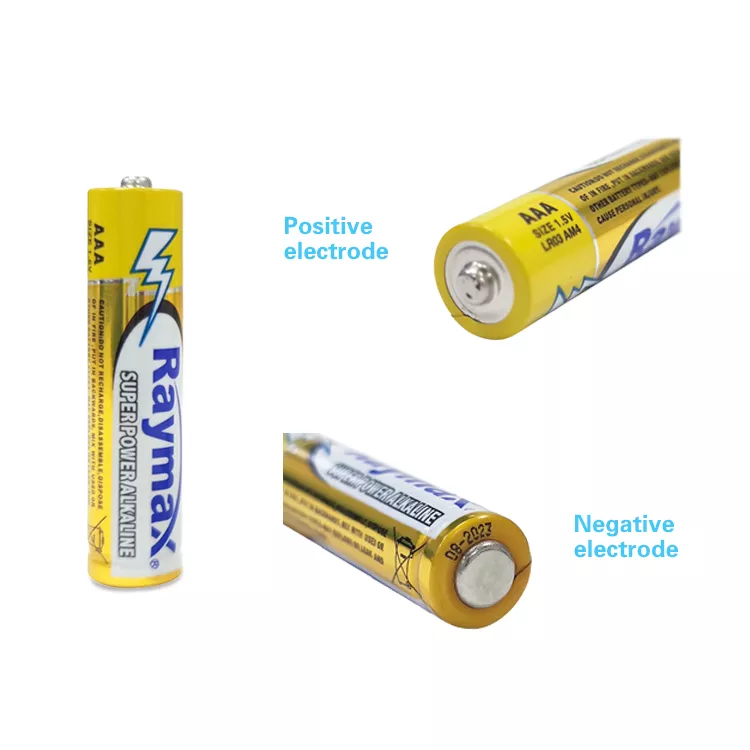Email format error
Email cannot be empty
Email already exists
6-20 characters(letters plus numbers only)
The password is inconsistent
Email format error
Email cannot be empty
Email does not exist
6-20 characters(letters plus numbers only)
The password is inconsistent

Alkaline battery & Button cell manufacturing process-News

Comparative Analysis of OEM Carbon Zinc Batteries with Other Battery Types
In today's world of electronics and portable devices, selecting the right battery type is crucial for ensuring optimal performance, longevity, and cost-effectiveness. Among the various options available, OEM carbon zinc batteries hold a unique position, particularly in applications where affordability and reliable performance are paramount. This article delves into a comparative analysis of OEM carbon zinc batteries with alkaline, lithium, and rechargeable batteries, highlighting their respective advantages and disadvantages across different usage scenarios.
1. Introduction
Batteries are ubiquitous in modern life, powering everything from remote controls to high-tech gadgets and industrial equipment. The choice of battery type significantly impacts device performance, cost, and environmental footprint. OEM carbon zinc batteries, known for their affordability and reliability, are widely used in low-drain devices where cost-effectiveness is a priority.
2. Comparison with Alkaline Batteries
Overview of Alkaline Batteries
Alkaline batteries are perhaps the most common type found in households and businesses worldwide. They are known for their versatility and reliability in a wide range of devices, from clocks to toys and flashlights.
Advantages of Alkaline Batteries
Alkaline batteries offer several advantages:
- Durability and Shelf Life: They have a longer shelf life compared to OEM carbon zinc batteries, making them ideal for stocking up and long-term storage.
- Cost-Effectiveness: Alkaline batteries are affordable and readily available, making them suitable for single-use applications where immediate power needs are essential.
Disadvantages of Alkaline Batteries
Despite their widespread use, alkaline batteries have limitations:
- Limited Rechargeability: Unlike rechargeable batteries, alkaline batteries cannot be recharged, contributing to environmental waste.
- Performance Drop in High-Drain Devices: They may struggle to maintain consistent power output in high-drain devices like digital cameras or gaming controllers.
Comparison with OEM Carbon Zinc Batteries
When comparing OEM carbon zinc batteries with alkaline batteries, several factors come into play:
- Cost Comparison: OEM carbon zinc batteries are typically more affordable upfront compared to alkaline batteries, making them a preferred choice for devices with lower power demands.
- Suitability for Low-Drain Devices: OEM carbon zinc batteries excel in applications with minimal power requirements, such as remote controls, clocks, and basic handheld devices.

3. Comparison with Lithium Batteries
Overview of Lithium Batteries
Lithium batteries are renowned for their high energy density and superior performance in demanding applications, such as smartphones, laptops, and electric vehicles.
Advantages of Lithium Batteries
Lithium batteries offer compelling benefits:
- High Energy Density: They pack more power per unit weight compared to OEM carbon zinc batteries and other traditional battery types.
- Longer Lifespan: Lithium batteries can endure hundreds of charge cycles, providing long-term cost savings despite their higher initial purchase cost.
Disadvantages of Lithium Batteries
However, lithium batteries come with certain drawbacks:
- Higher Initial Cost: They are more expensive upfront than OEM carbon zinc batteries, making them less economical for budget-conscious consumers.
- Safety Concerns: Certain types of lithium batteries, such as lithium-ion, require careful handling due to potential safety risks like overheating and fire hazards.
Comparison with OEM Carbon Zinc Batteries
The comparison between OEM carbon zinc batteries and lithium batteries revolves around:
- Application Specificity: OEM carbon zinc batteries are suitable for low-drain devices where cost efficiency is prioritized, whereas lithium batteries shine in high-performance applications demanding prolonged power and reliability.
- Cost-Effectiveness: For devices with moderate power requirements, OEM carbon zinc batteries often offer a more economical choice over the lifespan of the device.
4. Comparison with Rechargeable Batteries
Overview of Rechargeable Batteries
Rechargeable batteries are designed for multiple uses, reducing environmental waste and long-term costs associated with disposable batteries.
Advantages of Rechargeable Batteries
Rechargeable batteries provide significant advantages:
- Cost Savings: Despite a higher initial purchase price, rechargeable batteries can be reused hundreds of times, resulting in substantial long-term savings.
- Environmental Benefits: They reduce waste disposal compared to single-use batteries, contributing to sustainability efforts.
Disadvantages of Rechargeable Batteries
Yet, rechargeable batteries have limitations:
- Limited Lifespan: Rechargeable batteries degrade over time and with repeated use, requiring eventual replacement.
- Initial Cost Barrier: The upfront cost of rechargeable batteries may deter some consumers, especially in applications with sporadic usage patterns.
Comparison with OEM Carbon Zinc Batteries
When evaluating OEM carbon zinc batteries against rechargeable batteries:
- Economic Analysis: For devices with low power consumption or intermittent use, OEM carbon zinc batteries often offer a more cost-effective solution.
- Environmental Impact: While rechargeable batteries promote sustainability, OEM carbon zinc batteries remain viable for applications where frequent recharging is impractical or unnecessary.
5. Conclusion
In conclusion, the choice between OEM carbon zinc batteries, alkaline, lithium, and rechargeable batteries hinges on specific application requirements, economic considerations, and environmental impact. OEM carbon zinc batteries stand out for their affordability and reliability in low-drain devices, catering to consumers and businesses seeking cost-effective power solutions without compromising performance. Understanding the distinct advantages and limitations of each battery type empowers consumers to make informed decisions based on their unique needs and priorities.
Final Thoughts
As technology evolves and consumer preferences shift towards sustainability and cost efficiency, OEM carbon zinc batteries continue to play a pivotal role in powering everyday devices and industrial equipment. By weighing the pros and cons outlined in this comparative analysis, consumers can navigate the battery market with confidence, ensuring optimal performance and value for their investment.

